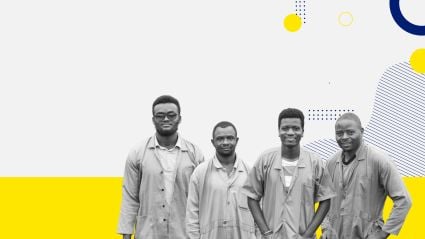
Please tell us about your background and what led you to start Birth Detroit.
I am a dreamer, a strategist, an entrepreneur, and a Black queer mom, bringing my lived experience and background in public health and business administration to bear to resource the safe, loving birth care infrastructure we all deserve. The challenges we experience in the US perinatal health system are personal to me. I have had a premature baby, a late-term loss, a rainbow baby, and my family has been impacted by infant death. Where others see statistics, I see myself, my family, and my communities. Birth Detroit is a justice response to poor birth outcomes and inequitable care options.
Do you envision replicating your success with Birth Detroit to serve more communities? If so, what are the barriers to expansion?
Absolutely—and this work should be community-led. Birth Detroit has been working since 2018, using a multi-pronged strategy, including community organizing, fund development, and advocacy to make midwives and birth centers a real option for Black birthing people in Detroit, and it is finally happening. This fall, we will open the city’s first freestanding birth center and the first-of-its-kind Black-led birth center in Michigan. Like my Birth Detroit dreammates and I have operationalized our vision for our communities, we would like to help other leaders like us operationalize the visions they hold for their communities.
What made you most interested in participating in the Milken Institute’s Financial Innovations Lab for Innovative Financing Models for Women’s Reproductive Health?
I want to thank Tenesha Duncan from Orchid Capital for the invitation. Tenesha and I have been working together since spring 2020 on resourcing and integrated financing for midwifery care and birth centers. I was interested to understand and contribute to how investors are thinking about reproductive health care financing. Reproductive health care in the US is a multibillion-dollar industry, yet community-led care solutions like birth centers struggle for resources and reimbursement—despite healthy outcomes and cost efficiency. Why is this? No one should be discussing reproductive health financing without discussing increasing access to midwifery care.
What was the most helpful part of the Lab process for you and your organization?
Birth Center Equity is a values-based network of Black, Indigenous, people of color (BIPOC)-led birth centers that demonstrates it is possible to fund community-led solutions through a national strategy. Being in the room helped me to understand fellow participant interests, goals, and perspectives and challenged me to consider how we can work together in the best interest of optimal reproductive health for all. Also, I hope I challenged folks to think about financing care solutions they would actually want for themselves and their families—and not invest in creating undesirable caste systems of care.
How has your earlier work in city, state, and national health organizations helped shape your current work to support midwifery for BIPOC?
My earlier work gave me a systems-level perspective and helped me understand infrastructure. My first job out of public health graduate school was Healthy Start project coordinator at the Detroit Health Department, and my last job there was as deputy director. I learned that despite the research supporting midwifery-led care, no one is investing in birth centers as essential community health infrastructure. Going back to school for my MBA helped me understand the flow of resources within systems and conceptualize strategies for change. Birth centers should be a population health improvement strategy in the US.
Tell us about your most recent initiative, Birth Center Equity (BCE).
BCE is on a mission to make midwifery care a real option in every community, by investing in Black, Indigenous, people of color-led birth centers. To date, BCE has invested more than $2 million in our network of 40 established and developing birth centers; our goal is $100 million over the next 10 years. We recently launched #GrowBirthCenters briefings to support prospective collaborators to make informed strategic investments and accelerate innovative strategies to advance optimal perinatal health through sustainable community care infrastructure. Chicago Beyond hosted us in Chicago. Next up will be Atlanta, San Francisco, and New York.
Based on advances in technology, health care, and investment in the sector, what do you see as the future of health care for women?
My hope is that advances in technology will support safe, quality, loving, high-touch care for all women, including birthing people in the hardest to reach places. Choosing to have or not have children, pregnancy, birth, and postpartum are some of the most vulnerable times in our lives. During these times, we need personalized and compassionate care. At Birth Detroit, we say: The spirit of care matters. I pray that the future of health care recognizes this and that we build systems of care that keep us safe and bring us all closer to our humanity.








